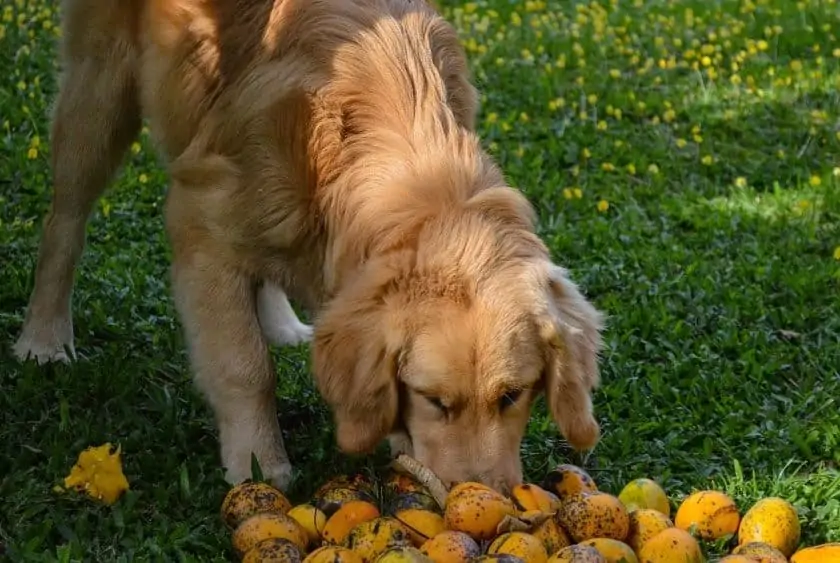So, we know that dogs can eat mango, but what about dried mango? If you’re wanting to treat your pooch to a sweet treat without negatively affecting their health, you’re in luck! Dogs can eat dried mango.
If you’re curious about why dried mango is a safe and healthy option for dogs to eat, keep reading!
Table of Contents
Benefits of dried mango for dogs
Dried mango is simply a dehydrated version of their fresh counterpart with the aim of preserving the fruit for longer.
This means that most of the nutritional content of dried mango is fairly similar to fresh mango, except for the vitamin C content. Vitamin C is heat-sensitive, and so the process of drying mango seems to decrease its content.
Still, dried mango is a healthy, nutritious, and tasty snack for humans and dogs alike! Here are the main benefits of dried mango for dogs.
- Dried mango is filled with dietary fiber, which means that it is a great option for dogs who struggle with stool inconsistency and constipation. Fiber also helps to keep dogs fuller for longer, so dried mango is ideal for giving your dogs a snack between meals to prevent them from scavenging for other foods.
- Mangoes and dried mangoes are filled with antioxidants that are highly beneficial for both the digestive system and the immune system. One of these antioxidants is zeaxanthin, which works to filter out blue light rays. This means that dried mango protects the dog’s eyes from age-related eye issues!
- Mangoes and dried mangoes are high in vitamin B, which helps to promote healthy brain neurotransmitters. This won’t make your dumb dog smarter, but it might help!
- Dried mango is filled with vitamin K and calcium, which help to support and promote healthy bones and joints.
- Mangoes and dried mangoes are rich in potassium, which helps to balance out high sodium intake and thus manages high blood levels.
Cons of dried mangoes for dogs
As with most fruits and foods that are deemed safe for dogs, there are some disadvantages to dried mango for dogs that need to be considered.
Unlike fresh mangoes, dried mangoes have a high calorie content. Where a cup of fresh mango has around 100 calories, a four-piece serving of dried mangoes can have up to 160 calories.
This means that if your dog is obese or just needing to lose some weight, dried mango might not be the best option.
Furthermore, dried mango can be expensive! If you plan on buying yourself the occasional bag of dried mango as a snack and you give your pooch the occasional slice, this shouldn’t be an issue.
However, if you’re planning on using dried mangoes as a frequent doggie treat, you might want to consider making your own dried mango at home in the oven from fresh mangoes.
This will also ensure that no added sugars are included in the dried mango, which can contribute to weight gain and dental problems for your dog!
Speaking of sugar, dried mango has a naturally high sugar content. Dogs process sugar in the same way as humans – too much sugar raises their blood sugar levels and heart rate, which can lead to weight gain and diabetes.
This means that you should only feed your dog dried mango in moderation. Alternatively, make your own dried mango or just feed them fresh mango!
Is dried fruit OK for dogs?
While dogs can eat dried mango, not all dried fruit is OK for dogs. It’s important to understand what fruits and foods are safe for dogs and which are not to prevent potentially damaging health problems.
The dried fruit that is dog-safe includes:
- Dried mangoes
- Dried jackfruit
- Dried pineapple
- Dried apricots
- Dried apples
- Dried blueberries
- Dried bananas
- Dried strawberries
Keep in mind that dried fruits have a higher sugar content than their fresh counterparts, so make sure only to feed them these fruits in moderation!
The dried fruits that dogs cannot eat include:
- Raisins (dried grapes) and currants
- Dried citrus fruits (lemon, lime, oranges, etc.)
- Dried tomatoes
Does mango make dogs sick?

Mango or dried mango will not make your dog sick. However, you’ve always got to be careful when introducing new foods into your dog’s diet. Make sure to feed your dog small portions of mango or dried mango to see if they respond well to it.
Some might not like the taste, and while this is rare, a few dogs might have an allergic reaction.
The only dangerous part of a mango for dogs is the pit. This is because the pit, like with apple seeds and other fruit pits, contains cyanide. Humans can withstand cyanide poisoning from a fruit pit, but dogs cannot.
However, as dried mango does not include the pit, dried mango is safe for a dog to eat!
The main issue with feeding dogs dried mango (and all fruits in general) is that too much of the fruit can cause stomach upset. This is because of the high sugar content, which can give your dog diarrhea and potential weight gain.
So…can dogs eat dried mango?
The answer is: yes, dogs can eat dried mango!
Dried mango, like most dried fruits that are safe for dogs, are a healthy and tasty treat for when your dog has been a very good dog.
Like its fresh counterpart, dried mango is high in potassium, vitamin K, and fiber, which are highly beneficial for dogs. This means that dried mango is great for balancing high blood levels, promoting healthy bones, and soothing constipation and inconsistent stool!
However, as with all foods, dried mango comes with some disadvantages. Dried mango has a high sugar content compared to fresh mango, which means you should only feed your dog this snack in moderation.
Also, not every dog will respond well to dried mango! Some might develop an allergic reaction, while some might find it upsetting for their stomach (especially if they eat too much!).
In short, you can feed your dog dried mango as a treat or reward, but only in moderation!

